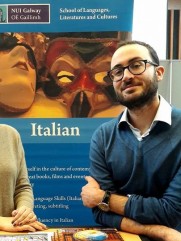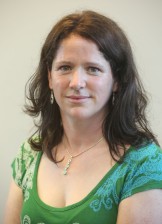- How do migrants adapt and translate themselves in a new territory? How do they make sense of the new environment, and how do they position themselves in it, using a new language?
- What translation/non-translation is evident – what remains in the home language and never moves to the new language? How can those ‘untranslatable’ elements become part of a transformed society?
- What work opportunities are created by language learning, and what part do the migrant’s personal story and background have in that?
- What are the opportunities and the difficulties for migrants entering the world of literary, musical, filmic or theatrical production? What visibility is allowed to personal stories?
People
Researcher: Andrea Ciribuco, NUI Galway
Andrea Ciribuco moved to Ireland in 2011, when he started a PhD at NUI Galway in the department of Italian, as a recipient of the Hardiman Research Scholarship. His PhD research explored matters of cultural identity in the language of migrant literature, focusing on the Italian American author and translator Emanuel Carnevali.
Since 2012, he taught Italian language and culture at NUI Galway at undergraduate, p ostgraduate and adult education level.
ostgraduate and adult education level.
His works on migrant literature and culture (especially Italian American) have appeared in international journals (see list on ResearchGate).
Prior to starting this fellowship, he worked on the IRC New Foundations project “My Story – My words: Language and Migration“, exploring language rights and multilingual creativity in contemporary Ireland.
Principal Investigator: Dr. Anne O’Connor, NUI Galway
Dr. Anne O’Connor is senior lecturer in Italian at NUI Galway, where she has taught since 2003. She has been the recipient of scholarships, fellowships and awards from the IRC, IRCHSS, the Royal Irish Academy, NAIRTL, AHRC, the Department of Foreign Affairs and the European Union. Her research interests include nineteenth-century history and  literature; translation studies; travel literature; transnational Ireland; cultural mediators, language teaching methodologies and community-based learning. She has published extensively in these areas: her latest book is Translation and Language in Nineteenth-Century Ireland: A European Perspective.
literature; translation studies; travel literature; transnational Ireland; cultural mediators, language teaching methodologies and community-based learning. She has published extensively in these areas: her latest book is Translation and Language in Nineteenth-Century Ireland: A European Perspective.



